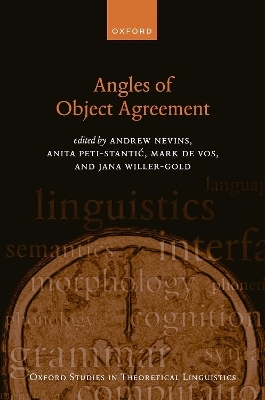
Angles of Object Agreement
Oxford University Press (Verlag)
978-0-19-289774-9 (ISBN)
This volume draws on insights from a range of theoretical perspectives to explore objects, agreement, and their intersecting angles, based on novel data from multiple language families. The recent expansion of agreement theories has revealed new ways of integrating phenomena that affect objects and their relational and featural properties with conventional object markers, under a single 'agreement' umbrella. The contributions to this book present the major advances in these new angles of research into object agreement, and highlight in particular the shared conditions on objects undergoing agreement that are attested in a large number of genetically unrelated languages and language modalities. Following a detailed introduction, the chapters are organized into four parts that explore respectively the mechanics of object agreement, constraints on symmetry, features of object agreement, and issues relating to the left periphery. The volume's findings and the novel questions that they raise will be of interest to theoretical linguists, typologists, sign language researchers, and anyone working on the theoretical analysis of Amazonian, Bantu, Romance, Semitic, and Slavic languages.
Andrew Nevins is Professor of Language Sciences at University College London. He has conducted research on the contribution of minoritized languages to linguistic theory, with work ranging from Zazaki Kurdish to Maxakalí Sign Language, across domains such as phonology, morphology, syntax, and semantics, and is involved with the training of new generations of researchers in methods of experimentally-based data collection. Within the domain of object agreement, he has worked on the person-case constraint, omnivorous number, and issues in exponence such as portmanteau and discontinuous expression of inflection. Anita Peti-Stantić is Professor at the Faculty of Humanities and Social Sciences, University of Zagreb. She is interested in the interface of syntax, semantics and information structure (primarily word order and clitic placement) but has also published on historical comparative sociolinguistics and language planning. Since 2017, she has been the PI of the Croatian Science Foundation project The Building Blocks of Croatian Mental Grammar: Constraints of Information Structure. Within the project, Peti-Stantić and her collaborators produced the Croatian Psycholinguistic Database available via the project website . Mark de Vos is an Associate Professor in Linguistics at Rhodes University South Africa and former chair of the Southern African Linguistics and Applied Language Studies Society. He obtained his PhD from Leiden University in the Netherlands after completing his Masters at Universitetet i Tromsø in Norway. He has published and supervised research around topics on coordination, agreement and general syntax as well as exploring the quantitative psycholinguistics of early literacy in isiXhosa. Jana Willer-Gold is a Postdoctoral Research Associate in the Department of Linguistics at University College London. Her research explores the theoretical modelling of agreement informed by experimental methods with a focus on conjunct agreement, resolution, gender feature, attraction, attachment height in relative clauses, and with particular reference to South Slavic languages. She has been involved in the projects Coordinated Research in the Experimental Morphosyntax of South Slavic Languages (EMSS) and Agreement Mismatches in Experimental Syntax: from Slavic to Bantu (ESSB).
Preface
List of abbreviations
The contributors
1: Jana Willer-Gold: Introduction: Objects, agreement, and their intersecting angles
Part I. Mechanics of object agreement
2: Mark C. Baker: Agree without agreement in object clitic doubling constructions
3: Vicki Carstens: Addressee agreement and clitic-raising in Kiunguja Swahili: Unlocking &P
4: Tanmoy Bhattacharya and Jyoti Sharma: A morphosyntactic account of agreement in Mara
5: Kristina Riedel: Object marking in Bantu: Reassessing agreement
Part II. Constraints on symmetry
6: Jason Overfelt: Asymmetrical symmetry in Tigrinya object marking
7: Maud Devos and Rozenn Guérois: Micro-variation in object marking in North-Mozambican Bantu languages
8: Marina Milkovi'c and Ronnie Wilbur: Agreement marking in Croatian Sign Language: A new view on 'odd' agreement
Part III. Features of object agreement
9: Markus Steinbach: Differential object marking in sign languages? Restrictions on (object) agreement in German Sign Language
10: Monica Alexandrina Irimia and Eva-Maria Roessler: DOM and other object marking strategies: More on the problem of complex licensers
11: Jana Willer-Gold and Anita Peti-Stanti'c: A multiple-agreement approach to auxiliary clitic drop in Croatian
Part IV. The left periphery
12: Simone De Cia: Topicality and object-past participle agreement in Friulian
13: Barbara Sonnenhauser and Paul Widmer: Object clause indexing in Albanian
14: Martina Gra%canin-Yuksek: Agreement in Turkish relative clauses
References
Index
| Erscheinungsdatum | 18.11.2022 |
|---|---|
| Reihe/Serie | Oxford Studies in Theoretical Linguistics ; 81 |
| Verlagsort | Oxford |
| Sprache | englisch |
| Maße | 163 x 241 mm |
| Gewicht | 806 g |
| Themenwelt | Geisteswissenschaften ► Sprach- / Literaturwissenschaft ► Sprachwissenschaft |
| ISBN-10 | 0-19-289774-8 / 0192897748 |
| ISBN-13 | 978-0-19-289774-9 / 9780192897749 |
| Zustand | Neuware |
| Informationen gemäß Produktsicherheitsverordnung (GPSR) | |
| Haben Sie eine Frage zum Produkt? |
aus dem Bereich


